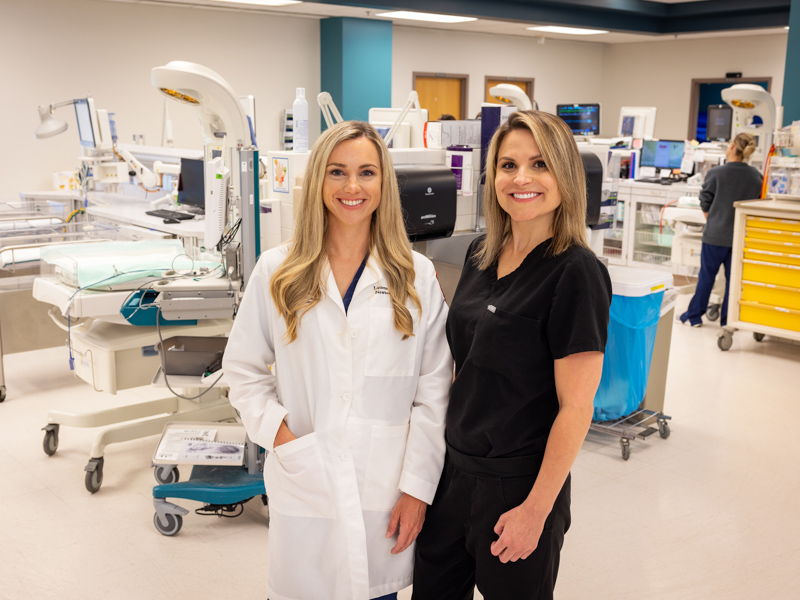Study: Babies with opioid addiction go home earlier with family-focused approach

Babies born with opioid withdrawal are able to go home about a week earlier when treated using a scoring tool that emphasizes a family’s presence over the standard approach.
Findings from the Eating, Sleeping and Consoling for Neonatal Opioid Withdrawal study, a nationwide clinical trial funded by the National Institutes of Health, were published in the New England Journal of Medicine.
Researchers enrolled 1,305 infants across 26 U.S. hospitals, including the University of Mississippi Medical Center. Infants cared for with ESC were medically ready for discharge after an average of 8.2 days, compared to about 14.9 days for those using a standard approach.
UMMC enrolled 20 infants and 16 mother-infant dyads.
In the U.S., at least one newborn is diagnosed with neonatal opioid withdrawal every 24 minutes.
Opioid-exposed newborns can develop neonatal opioid withdrawal syndrome, with symptoms including tremors, excessive crying and irritability, and problems with sleeping and feeding.
The ESC approach provides a function-based assessment of withdrawal severity centered on how well an infant can eat, sleep and be consoled. It prioritizes nonpharmacologic care, including increased family presence, holding, swaddling, and rocking in low-stimulus environments as first line treatment.
“ESC emphasizes parental involvement including education, support and empowerment of families to share in the decision making and care of their infant,” Dr. Lauren Tucker, associate professor of pediatrics and site investigator.
Hospitals, which have widely different approaches for caring for opioid-addicted babies, most often use the Finnegan Neonatal Abstinence Scoring Tool, a scoring system that assesses signs of withdrawal in more than 20 areas, but concerns have been raised about its subjectivity and overestimation of the need for opioid medication.
Until now, there hasn’t been strong evidence to support a different standard of care for these babies.
Developed about eight years ago, ESC hadn’t yet been rigorously evaluated in a large and diverse population of infants with NOWS before this trial.
Having evidence for best practices can reduce variability, improving outcomes for these infants and their families, researchers say.
The study also evaluated whether newborns received opioid therapy to manage their symptoms. Infants cared for with ESC were about 63 percent less likely to receive opioids: 19.5 percent in the ESC group received opioid therapy, compared to 52 percent in the FNAST group.
UMMC is one of 18 sites that make up the IDeA States Pediatric Clinical Trials Network, which, in response to the opioid crisis, prioritized improving the care and outcomes for infants with NOWS. That involvement informed design of the ESC trial.
“The ISPCTN’s distinct focus is to bring state-of-the-science clinical trials to rural and underserved populations,” said Tucker. “UMMC’s patient population provides unique and valuable data that is important for informing care for these vulnerable infants that were previously understudied.”
Tucker and Emily Fratesi, research nurse manager and site coordinator, coordinated the training of more than 50 providers and 300 nurses to implement the ESC care tool under the guidance of the tool creator and national experts.
UMMC was the first medical facility in the state to transition to the ESC care approach.
“Through this approach, mothers and medically stable infants are now able to room together,” said Fratesi, study site coordinator. “This facilitates bonding and allows the mother to respond to the infant’s needs on demand. This interaction has a positive influence and decreases length of stay.”
Participating hospitals were randomized to transition from usual care with FNAST to ESC at different time points throughout the trial. The findings are based on three-month outcomes. A two-year follow-up study of a subset of the infants is ongoing.
The study is part of the Advancing Clinical Trials in Neonatal Opioid Withdrawal Collaborative, funded by the Helping to End Addiction Long-term Initiative, a trans-agency effort to speed scientific solutions to stem the national opioid crisis.
Researchers say the study gives hospitals an evidence-based care approach for babies with NOWS.
“Results from this study have the impact to change clinical practice nationally,” said Fratesi.


